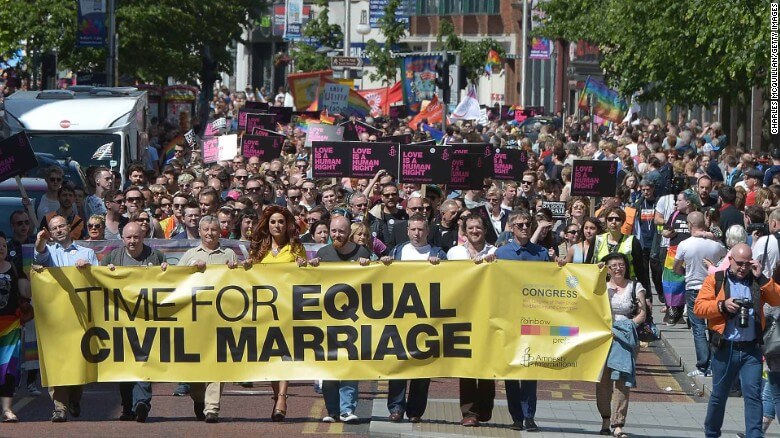On January 13, Northern Ireland legalised same-sex marriage.
However, same-sex couples in civil partnerships will not fall under the ambit of this new policy. Consultations later this year will address the issue of same-sex civil partnerships and the role of churches in such unions.
This move comes as a relief to the LGBT+ movement in the region. John O’Doherty, from the Love Equality Campaign, said that this was “the culmination of five years of campaigning for marriage equality and marks an enormous step forward for LGBT+ people”.
Labour MP, Conor McGinn expressed his support for this move saying that “It’s a good day for Northern Ireland, an important day for citizens’ rights across these islands and an exciting day for same-sex couples who can now register to marry”.
This change was met with numerous challenges. The unique power-sharing model in Northern Ireland requires the Sinn Fein and the Democratic Unionist Party to govern the region together. However, due to disagreements between the two parties, the Northern Ireland assembly collapsed and was only restored last week after a three-year hiatus.
In the meantime, marriage equality campaigners turned to Westminster for relief. Pursuant to this, MPs voted in favour of an Amendment to the Northern Ireland (Executive Formation Etc) legislation, which stipulates that abortion and same-sex marriage would be legalised on January 13, 2020, if the Northern Ireland Parliament was not operative by October 13, 2019. This deadline was not met.
Out of the 27 countries that have legalised same-sex marriages, 16 are in Europe. England, Scotland, and Wales achieved this landmark in 2014.
European countries have seen a significant correlation between the implementation of marriage equality and the reduction in suicide rates. A study done in Denmark and Sweden indicates a 46% reduction in suicides in Denmark from 1989 to 2002, and in Sweden from 2003 to 2016. This change is attributed to the legalisation of same-sex marriages in the two countries at the beginning of those time periods. While the last decade has seen significant progress on the issue, the aim to universalise marriage equality remains a distant reality.

